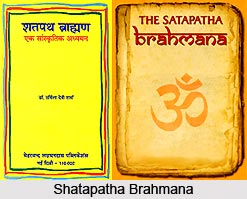 Shatapatha Brahmana is an appendix to the White Yajur Veda and is one of the prose texts describing the Vedic ritual. It was written about in 300 B C E but few portions of it are much older and were transmitted verbally from unknown people. It has references throughout the worship of primitive mother-earth, unnamed snakes and human sacrifice.
Shatapatha Brahmana is an appendix to the White Yajur Veda and is one of the prose texts describing the Vedic ritual. It was written about in 300 B C E but few portions of it are much older and were transmitted verbally from unknown people. It has references throughout the worship of primitive mother-earth, unnamed snakes and human sacrifice.
"Satapatha Brahmana" is one of the texts, which describes the Vedic ritual related to the Shukla Yajurveda. It includes the myths of creation and the deluge of Manu. The Shatapatha Brahmana means `Brahmana of one-hundred paths`. Shatapatha Brahmana is divided into two parts Madhyandina and Kanva. Madhyandina has a list of hundred Brahmanas in fourteen books, and the Kanva has the description of one hundred and four Brahmanas in seventeen books. Shatapatha Brahmana belongs to the Brahmana period of Vedic Sanskrit, dated to the first half of the first millennium B.C.
In Shatapatha Brahmana the fourteen books of the Madhyandina can be divided into two major parts. The first nine books have close textual comments, line by line, of the first eighteen books of the corresponding samhita of the Yajurveda. The next five books cover supplementary and ritualistically newer materials.
It also contains various theories of creation and wild legends which show that the old Sanskrit philosophers found it extremely difficult to determine the difference between gods and men. The text also specifies broadly the preparation of altars, ritual recitations, ceremonial objects, and the Soma libation. It also describes all the features of the symbols used in every ritual.
The Shatapatha-Brahmana appears to offer a thorough type of scepticism. Man makes gods, god makes a chief god and the chief god (Prajapati) makes the world and gods respectively. But the gods were mortal. Rites and austerities were invented which insure immortality. Death becomes alarmed. Death is promised that only without the body shall gods or men become immortal. But after the gods have become immortal, they are unable to determine which among them shall be greatest.













